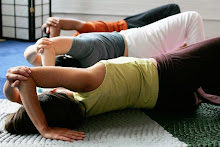
Put a tablecloth on top of a freshly polished dining room table, and you've got a recipe for disaster.
We're not sure who was responsible for the debris field on the floor between the table and the patio door, but we suspect Bean. She was sitting on the coffee table looking slightly guilty yet nonchalant, as only a cat of her fluffiness can pull off. Evidence of Sunday's collection atop the table was now all over the carpet. Chris's new library books, a notebook, a small project file, several colored highlighter pens, my purse, keys (just one set), three envelopes and two catalogs from Saturday's mail, a small faux-brass tray and six fat candles, and the tablecloth, all were evidence at the scene of the crime.
The table is new to us, a gift from Chris's mother, set up and polished just a week ago. Neither Bean nor Yoda has recalibrated their leaping and skidding to its new dimensions. As I cleaned up and rearranged the items, placing them again on the table, I was able to restore order. I had not perceived how much STUFF had accumulated on the table. It seemed neat and tidy, just the centerpiece, my purse, a small stack of books and a few pieces of mail. All it took was a small sliding cat to create a shambles! The next question is: where to put these things, if not on the table? Clearly, an improved level of organization is needed.
Each of us is like my dining room table. Barely noticed, habits good and bad, emotions, beliefs, attitudes, preferences, expectations accumulate on the surface. It all stays tidy, until it doesn't. A "sliding cat" can come in many forms: an injury, an illness, a new aspiration, any change. Happy events as well as troubling ones are able to cause disruptions to the status quo.
When I see a new client, I don't ask "What's wrong?" or "What's the problem?" I ask, "What are you interested in? What are you working on?" Some are dealing with serious difficulties, some are preparing for a physical challenge, others wish to improve their skill in music or sports. The genius of the Feldenkrais Method is that it focuses on improving function (what it is you want to DO), rather than repairing structure (rearranging the furniture). Persistent structural problems can resolve quickly when the function is clear. Back to my dining room table: I can clear off the mess and put it somewhere else, because it's a mess (structural solution). Or, I can prepare a lovely space to entertain you for dinner (functional solution). My results will be better and my experience more joyful with the functional approach!
The Feldenkrais Method can help you to develop greater awareness of your self and your environment. That's our regular spiel. On a more profound level, Moshe Feldenkrais knew that awareness could produce better intentions and better actions. Improvement is always possible, when your intentions are clear, and your actions support them. Now, what's for dinner?



No comments:
Post a Comment